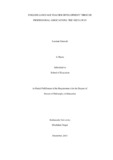Please use this identifier to cite or link to this item:
http://archive.nnl.gov.np:8080/handle/123456789/75| Title: | English language teacher development through professional associations: the NELTA way |
| Authors: | Gnawali, Laxman |
| Keywords: | Teacher professional development Nepal English Language Teachers’ Association |
| Issue Date: | 21-Feb-2018 |
| Abstract: | Teacher professional development (TPD) is an integral part of English as a foreign language (EFL) teaching. Without continuous growth, the quality of the teaching and learning will not be effective. Only if EFL teachers make professional development efforts by creating challenges for themselves and learning from their experiences, will they be able to cope with the changing situations. They may undertake the professional development initiatives such as training, action research, and reflective and collaborative practices. In this regard, English language teacher associations are a practical way to collaborative strategies for teacher professional development. This study explored TPD strategies that teacher associations such as NELTA employ and the process by which teachers undergo development experiences. It also looked into the contributions that the members make to these associations. The study was based on three theories - network theory, learning organization theory, social capital theory. The study followed an interpretive inquiry within the interpretive paradigm. Ten NELTA members were selected as participants using the purposive sampling technique. The data were then collected through narratives, interviews and documents which were analysed thematically and the conclusions were drawn. The study showed that the associations formally employed several strategies, stipulating them in their official documents, for the professional development of their members. It was found that the statute of the association had its principal intent on TPD. The strategic planning was taken as a guideline for the leaders and the central committee on prioritising matters for supporting and promoting teachers. The data showed that TPD was the core of the association activities. The TPD activities included organizing events, publishing, running blogs, maintaining mailing lists, and providing opportunities for foreign exposure and higher studies. The members benefitted from the opportunities that were made available through internal as well as external resources. The members also invested their time for the growth of the association. The comparison between the data from the documents and the participants showed that not all members benefitted from the opportunities: the benefits were proportionate to the contribution made by the members. The data also exposed grievances of the members who did not benefit significantly from the TPD opportunities. From the findings, it was concluded that the teachers learn and grow with the association by means of reciprocity where everybody is learning from one another. They enjoy the resources available and become resources themselves. The association members add to the capacity of the association bringing in ever new ideas. It was also concluded that the EFL teacher associations are learning organizations that build their strengths through their members: the better the mechanism of the associations, the better the learning for the members and the associations. The associations and their members build social capital with the resources and create conditions for their own learning. However, the associations have limitations: they have limited resources and cannot reach out effectively to the growing number of members. Moreover, the leadership provides opportunities only to those who contribute to the organization leading to the grievances from the members who do not enjoy the benefits. Based on the conclusions, implications for the teachers, teacher associations and policy makers were also drawn. The associations usually have thousands of members, so collecting information about them is helpful for creating opportunities for them as well as identifying the potential contributors. Likewise, more opportunities for the members to demonstrate their capabilities would help the association to build a better social capital that eventually benefits itself and its members. It would be more productive if the associations develop a more transparent system to avail opportunities for all members. By developing a feedback mechanism regarding the professional development opportunities and experiences, the association can maximise the distribution and minimise the grievances. Given the success of the association studied under this research, a formal declaration of the partnership with the Ministry of Education will indirectly give the association social prestige, thereby, building a better social capital. |
| Description: | A thesis submitted to School of Education in partial fulfillment of the requirements for the degree of Doctor of Philosophy in Education, Kathmandu University, Dhulikhel, Nepal, 2013. |
| URI: | http://103.69.125.248:8080/xmlui/handle/123456789/75 |
| Appears in Collections: | 300 Social sciences |
Files in This Item:
| File | Description | Size | Format | |
|---|---|---|---|---|
| PhD Thesis of Laxman Gnawali.pdf | 827.07 kB | Adobe PDF |  View/Open |
Items in DSpace are protected by copyright, with all rights reserved, unless otherwise indicated.